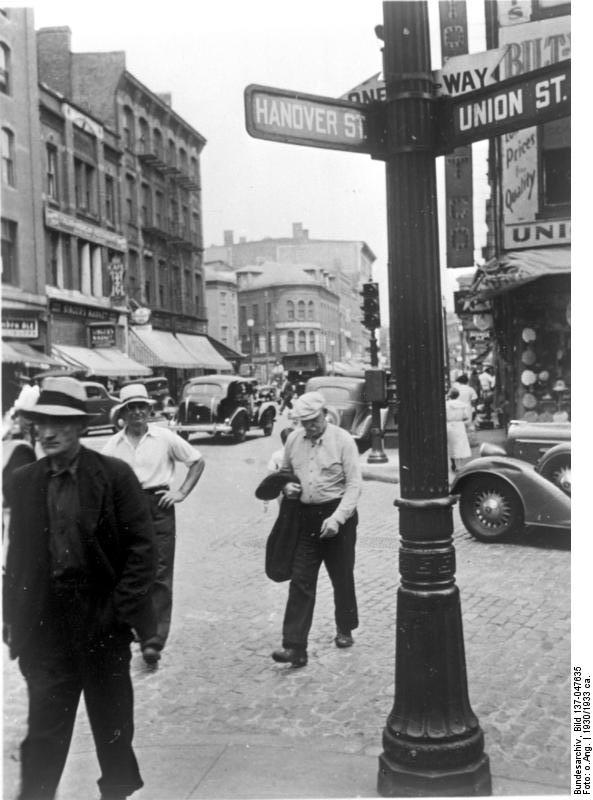North End Movers guide to moving in the North End, Boston, ma
Congratulations! You just put down first, last, and security deposit on your swanky new Hanover Street pad! Nice job! I’m sure you’re looking forward to all the pasta, cannolis, and other tasty treats that await you once you hire North End movers to complete your move.
Unfortunately, there’s a catch. Making a move to the North End presents a challenging environment for movers of all ages. Congested streets, narrow staircases, and limited parking often make a recipe for a moving day nightmare. To try to minimize the pain, we’ve put together this little guide to moving in one Boston’s oldest neighborhoods.
 The North End in 1930. (Photo by Bundesarchiv, Bild 137-047635 / CC-BY-SA [CC BY-SA 3.0 de], via Wikimedia Commons)
The North End in 1930. (Photo by Bundesarchiv, Bild 137-047635 / CC-BY-SA [CC BY-SA 3.0 de], via Wikimedia Commons)
Boston Moving Permits: A necessity when you move to the North End
Due to the severe lack of parking in the area, it’s essential to reserve Boston Moving Permits for your truck. Otherwise, it will be difficult to find a space to park during your move to the North End. If your movers cannot park near your building then your move time and difficulty will increase. Have you ever had to carry a dresser through traffic? We have — and, shockingly enough, it’s neither fun nor safe.
The City of Boston charges $61 per address for permits, and $4 each for tow zone signs, both of which are available in Boston City Hall. Some addresses will cost more if they necessitate blocking off metered spaces (usually $20 per meter head).
Most Boston moving permits cost $69 for a single address.
We can provide permit acquisition service for a $75 fee for the first permit, $125 for two, and $150 for three or more. This fee is in addition to the cost of the permits.
If you’d like to save the money and get the permits on your own, we offer a simple guide to doing so here. (Of course, you’ll still be on the hook for the $69 the city charges — or more if you’re blocking off meters.)
Unfortunately, there’s a good chance that some genius will ignore the tow zone signs and park in the spot. If so, call the Boston Police Non-Emergency line at (617) 343-4200 to have the vehicle(s) removed. Check the space as early as possible; the police can take an hour or more to respond to the call. With the scarcity of parking it’s not unheard of for one of your charming new neighbors to tear down the signs. If this happens, you can get replacement at City Hall as long as you still have your receipt. Yes, it’s really annoying, but there isn’t much you can do about it other than use enough tape to make the signs more difficult to take down.
Queen Box Springs – The Bane of North End Movers !
Beware of large furniture. The North End’s tight doorways and twisting staircases were not designed to accommodate modern furniture. Couches, box springs, and pianos are often problematic. Sometimes North End movers can hoist larger items through a window, but other items might require a craning company, and craning companies aren’t cheap. Depending on your situation, selling or disposing of your larger items may be a cost-effective option. Furniture can be donated to local non-profit organizations such as Goodwill, Salvation Army, or Boomerang’s.
It’s fairly common during a move to the North End for some people to buy a couch or box spring from the old tenant. If they had to have the item hoisted or craned into the unit, they may not want to deal with the hassle of getting it out. This is a good way for everybody to save a few bucks.
Size Matters: Smaller Trucks are Better in the North End
Also, on larger moves, truck size can be a problem. We’ve found that using moving trucks longer than 16 feet can cause some issues in this neighborhood, so it may be necessary to use two trucks. Some streets, like Hanover or Commercial, can handle a larger truck, while some, like Henchman Street, cannot.
The North End is a densely packed, historic neighborhood. So North End movers have been operating here for hundreds of years. It’s home to Paul Revere’s house. It’s the site of the Great Molasses Flood. And the North End is where to find the graves of some of this country’s earliest revolutionaries. By all accounts (particularly if you like dining out), it’s a great place to live. Its apartment buildings, however, are not quite built for the 21st century.
But, if you plan carefully, acquire the appropriate permits, select compact, yet elegant furniture, and pack your belongings efficiently, you can take a lot of stress out of your transition into one the country’s most famous neighborhoods.
Ready to move to the North End? Get a quote today!

